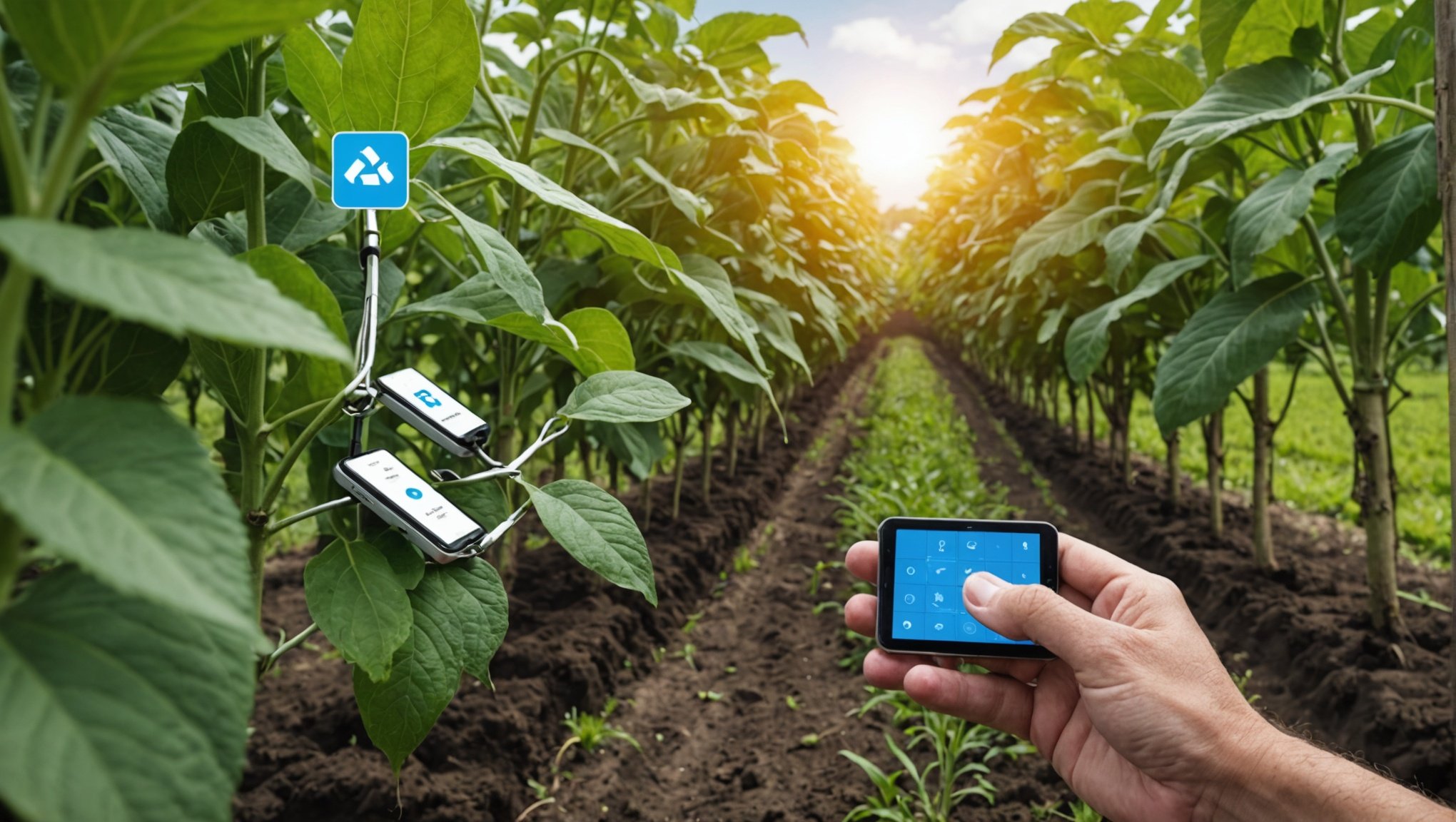As the UK agricultural sector faces increasing challenges, blockchain technology emerges as a game-changer for cooperatives. This digital ledger enhances transparency, traceability, and efficiency in supply chains, empowering farmers and consumers alike. The integration of blockchain streamlines operations, reduces costs, and fosters trust among stakeholders. By embracing this innovative solution, agricultural cooperatives can unlock new opportunities, ensuring sustainability and resilience for the future. Discover how blockchain is set to revolutionize agriculture in the UK, providing farmers with the tools to thrive in a competitive landscape.
Overview of Blockchain Technology
Blockchain technology is a revolutionary system that underpins many modern digital processes. At its core, blockchain is a distributed ledger technology that allows data to be stored across a network of computers. This ensures that the information is secure, transparent, and immutable. The fundamentals of blockchain involve three main components: blocks, nodes, and miners. Blocks are digital pieces of information; nodes are devices that maintain copies of the blockchain; and miners are participants who validate and record new transactions.
Also read : Effortless collection management with automation software
In various sectors, blockchain operates by enhancing transparency and reducing the risk of fraud. For example, in finance, blockchain enables secure and fast transactions without intermediaries. In healthcare, it provides a secure way to store patient records. Its application in supply chain management ensures traceability and authenticity of products, which is crucial for consumer trust.
In modern agriculture, blockchain technology plays a significant role by improving traceability of food products from farm to table. This not only helps in ensuring food safety but also in building consumer trust by providing detailed information about the origin and quality of agricultural products. The integration of blockchain in agriculture can lead to more sustainable and efficient farming practices, thereby transforming the industry.
Topic to read : Streamline your collections with top automation tools
Transformative Advantages for Agricultural Cooperatives
Blockchain technology offers numerous advantages for agricultural cooperatives, significantly transforming the way they operate. One of the primary benefits is enhanced efficiency through streamlined processes. By utilising blockchain, cooperatives can automate various administrative tasks, reducing the time and resources spent on manual record-keeping and transaction processing. This automation leads to faster decision-making and reduces overhead costs, allowing cooperatives to allocate resources more effectively.
Another key advantage is improved traceability for supply chain management. Blockchain enables cooperatives to track the journey of agricultural products from farm to consumer with precision. This traceability ensures that each product's history, including its origin and handling, is accurately documented and accessible. As a result, cooperatives can quickly identify and address any issues related to product quality or safety, thereby enhancing consumer confidence.
Increased transparency and trust among stakeholders is also a significant benefit. Blockchain's immutable ledger allows all parties involved to access and verify transaction records, fostering an environment of openness and accountability. This transparency not only builds trust among farmers, suppliers, and consumers but also strengthens cooperative relationships, encouraging collaboration and innovation within the agricultural sector.
Applications of Blockchain in Agriculture
Blockchain technology is revolutionising agriculture technology by offering innovative solutions to longstanding challenges. One of the prominent blockchain applications in this sector is the use of smart contracts to automate transactions. These contracts are self-executing agreements with the terms directly written into code, ensuring that transactions between parties are completed automatically when conditions are met. This eliminates the need for intermediaries, reducing costs and increasing efficiency.
Another significant application is the creation of digital identities for crops and livestock. By assigning unique identifiers to each entity, farmers can maintain accurate records of their agricultural products. This system enhances traceability and helps in monitoring the lifecycle of crops and livestock, from production to sale.
Moreover, blockchain plays a crucial role in tracking food provenance. By recording every step of the food supply chain on an immutable ledger, stakeholders can ensure the quality and safety of food products. Consumers, in turn, gain access to detailed information about the origin and handling of their food, fostering trust and transparency in the supply chain. These advancements not only improve operational efficiency but also enhance consumer confidence in agricultural products.
Case Studies of UK Agricultural Cooperatives
In the UK, cooperatives are increasingly adopting blockchain to enhance their operations. A notable example is a dairy cooperative that implemented blockchain to improve traceability and transparency. By utilising this technology, the cooperative can track milk from farm to consumer, ensuring quality and authenticity. This initiative not only boosts consumer trust but also streamlines supply chain management.
Similarly, grain cooperatives have embraced blockchain to address traceability challenges. By recording every stage of grain production and distribution on an immutable ledger, these cooperatives can guarantee the quality and origin of their products. This level of detail is invaluable for both consumers and stakeholders who demand transparency and accountability.
Early adopters of blockchain in the UK agricultural sector have learned valuable lessons. One key takeaway is the importance of integrating blockchain with existing systems to maximise efficiency. Additionally, cooperatives have found that training staff to understand and manage blockchain systems is crucial for successful implementation. These insights are paving the way for other cooperatives to adopt blockchain, ensuring they benefit from enhanced efficiency, transparency, and consumer trust. As more UK cooperatives explore blockchain, the agricultural sector is poised for significant transformation.
Challenges in Implementing Blockchain Technology
Implementing blockchain technology in the agricultural sector presents several challenges that need addressing for successful integration. One significant barrier is the technological hurdles and the need for robust infrastructure. Blockchain requires a reliable digital network, which can be a challenge in rural areas where agricultural cooperatives often operate. The absence of necessary technological infrastructure can hinder the seamless adoption of blockchain solutions.
Another challenge is the resistance to change among cooperative members. Many agricultural cooperatives have long-standing practices and may be hesitant to adopt new technologies. This resistance can stem from a lack of understanding of blockchain's benefits or fear of disrupting traditional methods. Overcoming this barrier requires effective communication and education to demonstrate the practical advantages of blockchain technology.
Regulatory considerations and compliance issues also pose challenges. Blockchain operates on a global scale, and navigating the complex landscape of regulations can be daunting. Cooperatives must ensure their blockchain applications comply with local and international laws, which can be time-consuming and costly. Addressing these challenges requires a strategic approach, focusing on building the necessary infrastructure, fostering a culture of innovation, and ensuring regulatory compliance to fully harness the potential of blockchain in agricultural technology.
Strategic Recommendations for Implementation
Implementing a blockchain strategy in agricultural cooperatives requires a well-defined implementation roadmap. A step-by-step guide can facilitate this process, ensuring that cooperatives efficiently integrate blockchain technology into their operations.
1. Assessment and Planning: Begin by assessing the cooperative's current systems and identifying areas where blockchain can add value. Develop a detailed plan outlining the objectives, timeline, and resources required for implementation.
2. Stakeholder Engagement: Engaging stakeholders is crucial. Cooperative management should involve farmers, suppliers, and consumers in the planning phase to ensure their needs are addressed. Regular communication and feedback sessions can foster a sense of ownership and reduce resistance to change.
3. Training and Education: Providing comprehensive training for all members is essential. This includes educating them about blockchain's benefits and how to use the new system effectively. Well-informed stakeholders are more likely to embrace the technology.
4. Partnerships with Technology Providers: Building partnerships with experienced technology providers can ease the implementation process. These providers offer expertise and support, helping cooperatives navigate technical challenges and ensuring a seamless transition to blockchain-based systems.
By following these strategic recommendations, agricultural cooperatives can successfully implement blockchain, enhancing efficiency, transparency, and trust within their operations.
Future Trends in Blockchain for Agriculture
Exploring the future of blockchain within agriculture reveals exciting possibilities for agricultural innovation. Predictions indicate a growing adoption of blockchain as farmers and cooperatives recognise its potential to revolutionise the industry. This trend is driven by blockchain's ability to enhance transparency, efficiency, and trust throughout the agricultural supply chain.
Emerging technologies such as the Internet of Things (IoT) and Artificial Intelligence (AI) are set to complement blockchain solutions, offering integrated systems that provide real-time data and predictive analytics. IoT devices can collect data from fields and livestock, which, when combined with blockchain, ensures secure and immutable records. Meanwhile, AI can analyse this data to optimise farming practices, predict crop yields, and manage resources more efficiently.
Blockchain also plays a pivotal role in promoting sustainable agricultural practices. By providing transparent records of farming methods and resource usage, blockchain encourages environmentally friendly practices and helps farmers meet sustainability standards. Additionally, it enables consumers to make informed choices by offering insights into the environmental impact of their food.
As these technologies continue to evolve, the future of blockchain in agriculture looks promising, paving the way for enhanced productivity and sustainability in the sector.
Policy Considerations and Support
Navigating the realm of agricultural policy is crucial for the successful integration of blockchain technology in agriculture. Existing policies often dictate how blockchain can be utilised, impacting its adoption and implementation. Blockchain regulations are evolving, with governments recognising the need to establish frameworks that ensure secure and ethical use of this technology. These regulations focus on data privacy, transaction security, and the interoperability of blockchain systems within the agricultural sector.
Government support plays a pivotal role in encouraging the adoption of blockchain. By offering incentives such as tax breaks or grants, governments can motivate cooperatives to invest in blockchain infrastructure. These incentives not only alleviate financial burdens but also signal a commitment to fostering innovation in agriculture.
Collaboration between policymakers and cooperatives is essential to align regulations with the practical needs of the agricultural community. Policymakers must engage with cooperatives to understand their challenges and aspirations, ensuring that agricultural policy supports rather than hinders technological advancement. This collaboration can lead to the development of policies that promote transparency, efficiency, and sustainability in agriculture, ultimately benefiting farmers, consumers, and the environment.
Conclusion and Call to Action
The adoption of blockchain technology offers transformative potential for agricultural cooperatives, enhancing efficiency, traceability, and transparency. As demonstrated, blockchain can streamline operations, ensure product authenticity, and foster trust among stakeholders. However, the journey towards full blockchain adoption requires proactive engagement and commitment.
Stakeholders are encouraged to actively explore blockchain solutions. By understanding and embracing this technology, cooperatives can position themselves at the forefront of agricultural innovation. Engaging cooperatives in this process is crucial; it ensures that the unique needs and challenges of each cooperative are addressed, paving the way for successful implementation.
To support this transition, a wealth of resources is available. Cooperatives can access guides, workshops, and expert consultations to gain a deeper understanding of blockchain's applications. These resources provide valuable insights into best practices and strategies for effective blockchain integration. Additionally, engaging with technology providers can offer tailored solutions and technical support, ensuring a smooth transition.
By taking these steps, agricultural cooperatives can unlock the full potential of blockchain, driving efficiency and sustainability in the sector. This call to action aims to inspire cooperatives to embrace blockchain, fostering a future of innovation and growth.











